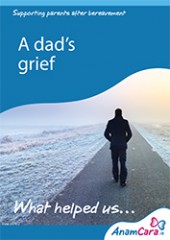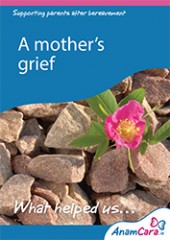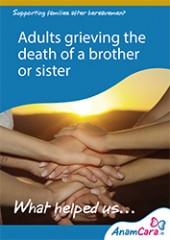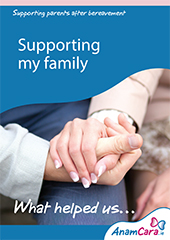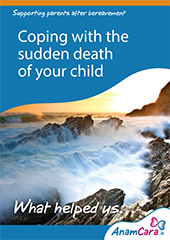Bereaved Parents
Please click HERE to visit our video archives and watch bereaved parents speak in Anam Cara’s Information videos, on themes such as The Grieving Family and Sudden and Traumatic Death.
You can also click HERE to watch different speakers at the October 2015 launch of Anam Cara’s Information Pack.
It’s so high you can’t get over it,
It’s so low you can’t get under it,
It’s so wide you can’t get round it,
You must go through the gate.
Ref: “Someone to talk to”, a handbook on childhood bereavement by Pat Donnelly

About Grief
No one at Anam Cara feels that their loss is worse then that of someone else. We know that we are all bereaved parents trying to cope with what life has thrown at us and face the future, even if only one day at a time. We know our lives have not ended just changed since our children have died. We also have a choice now, we can either try and find new purpose and meaning in life. We can even do that by helping each other along this journey. Or we can choose the other route which we are all familiar with, from those dark early days of grief and bereavement.
Grief is a powerful and sometimes overwhelming journey, and the following is a list of some of the common physical and emotional reactions that many bereaved parents may experience:
- A need to tell and retell and remember things about the child and the details of the child’s death
- Loss of appetite or overeating
- You cease to ‘live’ and merely ‘exist’
- That part of you has died
- Restlessness, aimless activity, difficulty concentrating, forgetfulness
- Finding it difficult to make even simple decisions
- Searching for or expecting the child who died to walk in the door or call on the phone; hearing the child’s voice; seeing the child’s face; dreaming about the child
- Wondering if you are losing your mind
- Going through the “motions” of every day living
- Physical exhaustion, sleeplessness, lack of desire to get out of bed
- Feeling fragile and vunerable
- In dread of bumping into people
- Guilt – thoughts and feelings of “If only I had…” as well as awareness of aspects of the relationship that were less than perfect
- Tightness in the throat, heaviness in the chest, a “lump” in the stomach
- Respiratory reactions – excessive yawning, gasping, sighing, hyperventilating
- Constantly feeling cold
- All family occassions very difficult
- Difficulty going on holidays or away without missing the child
- Difficulty coming home without missing the child
- Everything reminds you of the child
- Finding it hard to cope with the changing seasons
Anxiety
- A feeling of numbness or an empty feeling that seems indefinable
- Crying at unexpected times and experiencing mood changes for minor reasons
- Anger – at God, at the people around us, at the person who died, at things which did or did not happen
Depression
- Continually searching for answers
- Questioning or challenging your faith or philosophy of life
- On going difficulty with special days, such as birthdays, anniversaries, weddings, holidays
- Feeling unable to cope all the time, then falling back again
- Not being able to sleep or sleeping all the time
- Depression and grief symptoms are very similar, it is important that you seek advice from your GP if you have concerns about your mental health.
Coping with Grief
All of these reactions are natural and normal. It is important not to ignore one’s feelings, but instead to learn to communicate them.
- Record how you are feeling or write to your child in a journal, use your journal to express feelings you can’t express face to face
- A balanced diet, rest and moderate exercise are especially important at this time, walking is ideal to help clear the head
- If the appetite is not there talk to a pharmacist about vitamin supplements
- Go easy on yourself, you will not be able to do your what you normally do. Grieving is exhausting and can affect our mental and physical health
- Be patient with yourself and your emotions
- Avoid major decisions if possible (changing residence, changing jobs, etc.) for at least a year
- Avoid making hasty decisions about your child’s belongings. Do not allow others to take over or rush you. Do it at your own pace when you are ready
- Cry freely as you feel the need. It is a healthy expression of grief and releases tension
- Talk about your feelings or find other ways to express your emotions (writing/art)
- Find a good listener, someone who will just let you talk Anam Cara will help facilitate this
- Often talking to another parent who has lost a child can help as they are on the same journey as yourself, just a little bit further down the road.
- One’s religious faith or spirituality may also be a source of support, comfort, strength and hope at this time
- If you feel unable to cope , are anxious all the time or having difficulty managing the intense emotions you are experiencing, don’t suffer in silence it might be helpful to seek the advice from your GP or a professional counselor.


